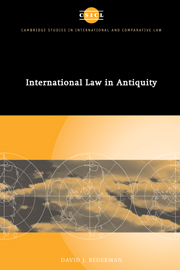Book contents
- Frontmatter
- Contents
- Acknowledgments
- List of abbreviations
- Maps
- 1 A methodological introduction: this study and its limitations
- 2 State relations in ancient civilizations
- 3 Religion and the sources of a law of nations in antiquity
- 4 Making friends: diplomats and foreign visitors in ancient times
- 5 Making faith: treaty practices amongst ancient peoples
- 6 Making war: the commencement and conduct of hostilities in ancient times
- 7 Civilization and community in the ancient mind
- Topical bibliography
- Index
- CAMBRIDGE STUDIES IN INTERNATIONAL AND COMPARATIVE LAW
5 - Making faith: treaty practices amongst ancient peoples
Published online by Cambridge University Press: 23 October 2009
- Frontmatter
- Contents
- Acknowledgments
- List of abbreviations
- Maps
- 1 A methodological introduction: this study and its limitations
- 2 State relations in ancient civilizations
- 3 Religion and the sources of a law of nations in antiquity
- 4 Making friends: diplomats and foreign visitors in ancient times
- 5 Making faith: treaty practices amongst ancient peoples
- 6 Making war: the commencement and conduct of hostilities in ancient times
- 7 Civilization and community in the ancient mind
- Topical bibliography
- Index
- CAMBRIDGE STUDIES IN INTERNATIONAL AND COMPARATIVE LAW
Summary
This chapter continues the previous discussion of the ancient world's engagement with the ideas of community, tolerance, and trust, the basic prerequisites for the development of international law. The focus shifts away from ancient civilizations' treatment of individual foreigners, whether they be visiting merchants, resident aliens, or honored guests and emissaries. Instead, the goal now is to explore the ways that ancient peoples pledged their troth in international relations. The emphasis here must be on the formal methods and structures of ancient treaty-making, the nature and sources of international legal obligation (partly manifested in international agreements) having already been considered earlier in this study. This chapter will examine the forms of treaties in antiquity, their substantive terms and conditions, as well as consider the procedures by which they were concluded, altered, and terminated.
Beginnings of the ancient treaty tradition in the Near East
General suppositions and the earliest texts
Much historiographic attention has been directed to examining the structure and forms of ancient Near Eastern international agreements. The bulk of this literature was inspired by parallels between biblical texts and the extant records of Egyptian and Hittite international transactions. As a result of this investigation, the contours of which will be reviewed here, some scholars have suggested that there is an essential unity in “the ancient oriental treaty pattern.”
- Type
- Chapter
- Information
- International Law in Antiquity , pp. 137 - 206Publisher: Cambridge University PressPrint publication year: 2001

